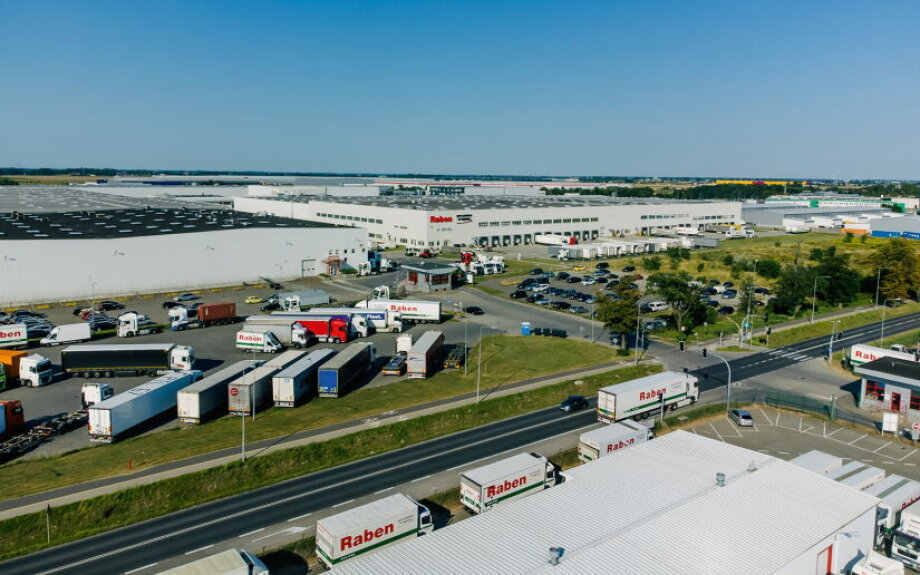The beating heart of Polish logistics


Three decades ago, Gądki was just a dot on the map—without infrastructure, highways, industry. But Raben saw potential. “We were the first,” recalls Lucyna Zaborowska-Princ, Regional Director at Raben Logistics Polska. “We built here because we believed this would become a key route between Berlin and Warsaw. At the time, it felt like a leap of faith,” she adds. “But we knew that Greater Poland had the potential to become a strategic logistics center not just for Poland, but for all of Central Europe. That intuition became our foundation.”
That foresight laid the foundation for what is now Raben’s largest Polish branch and the core of its logistics operations. Today, Gądki and nearby Robakowo house more than 140,000 m² of warehouse space, with the newest crown jewel being a 44,000 m² high-bay facility in Poznań—the largest of its kind in any Polish city as of 2024.
Gądki is no longer an isolated node but the beating heart of a pan-European network.
Behind every strong heart lies a resilient backbone. Raben’s is its integrated network of daily international connections, spanning up to 55 routes per day and managing thousands of pallets. This operational scale allows for dynamic, real-time adaptation.
At the same time, Gądki hosts the company's strategic nerve center. “Our management is embedded here,” explains Sebastian Bujnowicz, Regional Sales Manager at Raben Logistics Polska. “They are the eyes and ears: observing market shifts, listening to clients, and reacting quickly.”
This proximity to operations ensures quick decision-making, especially in today’s volatile supply chain environment. Raben’s leadership doesn’t just respond to change—it often anticipates it.
This reflexive capability proved essential during market disruptions. “Having direct visibility from our nerve center means we’re not waiting for signals—we're already moving,” Bujnowicz explains. “Our decisions aren’t delayed by hierarchy. They happen in real time, with real consequences.”
Raben’s Poznań warehouse reflects the company’s ability to customize its “circulatory system.” With multi-client solutions at its core, the warehouse provides shared operational resources and cost-effective models, without sacrificing service quality.
Though the facility is not yet at full capacity, the pipeline is active. “The racks are ordered,” jokes Bujnowicz. But behind this humor is a serious advantage: flexibility. Whether clients need one pallet today or 33 tomorrow, Raben can deliver.
In every smart organism, the brain needs a steady supply of trained neurons – and for Raben, that means people. Through its partnership with the Poznań School of Logistics (WSL), the company trains and hires top talent. Raben’s experts teach at WSL, guide student research, and develop academic programs, including the newly sponsored “Logistics Operations” track. This collaboration goes beyond recruitment—it's a long-term investment in shaping the next generation of logistics professionals.
Great talent also comes from other academic institutions. One example is Wojciech Szafran, now General Director of Raben Logistics Polska, who joined the company as an intern from the Poznań University of Technology. His rise from intern to executive reflects the company’s culture of nurturing potential and promoting from within.
But talent isn’t just about people, it’s also about ideas. “We’re investing in innovation too,” notes Zaborowska-Princ. “Not just teaching students but learning from them, and applying that knowledge to create better logistics solutions. There’s an incredible energy that comes from working with young minds,” she continues. “They challenge us, and we welcome that. We’re not only shaping their future—they're also influencing ours.”
The market is the organism’s environment—often unpredictable. Full-truckload transport, especially in the automotive sector, is under pressure. “Volumes are shrinking,” says Bujnowicz. “We saw this before in 2008. Since then, we’ve diversified our client portfolio to reduce risk.”
One thriving segment is LTL (less-than-truckload). It has become a barometer of economic agility, as clients increasingly prefer small, frequent shipments to preserve cash flow. Raben’s strength in LTL—especially for B2B and B2Market clients like DIY chains and food retailers—positions it well for this shift.
Sustainability is also becoming a client priority. Raben’s intermodal transport solutions—combining road and rail—address this, even as infrastructure limitations pose challenges. Eco-trucks, modular containers, and dedicated green routes are all part of the offering.
Raben doesn’t just survive changes—it adapts to them, like a healthy organism responding to environmental stimuli.
From its heart in Gądki to its network of limbs across Europe, Raben operates like a living system: coordinated, intelligent, and future-ready. The anatomical metaphor is more than clever branding. It reflects how deeply the company thinks about structure, function, and sustainability.
“Logistics isn’t just a cost,” Bujnowicz concludes. “It’s added value. And Raben is the partner who understands how to deliver it—with a strong spine, a smart brain, and a heart that never stops beating. We don’t just move goods,” he adds. “We move businesses forward. And that’s the kind of logistics DNA we’ve cultivated.”